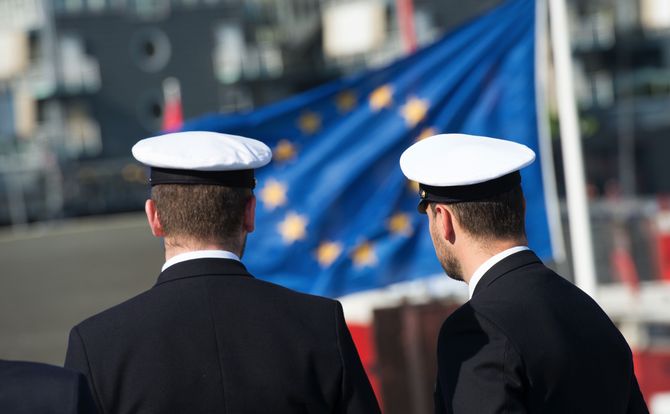As the nominee to serve as the EU's next High Representative for Foreign Affairs and Security Policy, Spanish Foreign Minister Josep Borrell will have an opportunity to update Europe's approach to foreign policy. Chief among the challenges facing the bloc is to reassert its own sovereignty in an age of great-power politics.
The last five years have not been kind to the European Union’s foreign-policy prospects. A new great-power competition is shunting aside the international rules-based order, and aspects of globalization – from trade to the Internet – are being used to divide rather than unite countries. Meanwhile, the EU’s geostrategic neighborhood has become a ring of fire.
These challenges mainly reflect a shift in the global balance of power, which has fundamentally changed the United States’ foreign-policy outlook. As the European Council on Foreign Relations explains in a new report, global developments have left EU countries increasingly vulnerable to external pressures preventing them from exercising sovereignty. Such exposure threatens the EU’s security, economic, and diplomatic interests, by allowing other powers to impose their preferences on it. Making matters worse, the EU’s governing institutions have done little to overcome the divisions among member states, and they have not played a relevant role in responding to crises such as those in Ukraine, Syria, and Libya.
With the nomination of Josep Borrell to serve as High Representative of the Union for Foreign Affairs and Security Policy, the EU has an opportunity to relaunch its foreign policy. Currently the foreign minister of Spain – itself one of the EU’s new power centers – Borrell’s task will be to unite EU institutions and national foreign ministries behind a common EU-level foreign policy.
Beyond that, Borrell will face three challenges. The first is to secure Europe’s strategic sovereignty. From day one, Borrell will need to start developing strategies for managing the bloc’s most vexing diplomatic and security issues, from the threats posed by Russia and China to the potential powder kegs in Syria, Africa, and the Balkans. Borrell must chart a new course forward, neither ignoring dissenting views from member states nor settling for the lowest common denominator of what all members say they can accept.
To that end, Borrell should consider offering a package deal, similar to the one agreed by the European Council in nominating a new EU leadership team. Any such compromise should balance a tough stance on Russia with creative engagement on the EU’s southern flank. The EU doesn’t necessarily need new foreign policies, but it does need new mechanisms for implementing its agenda, as well as competent leadership that can inspire confidence within all the member states. In reasserting the EU’s sovereignty, the new high representative will have to deal with everything from US secondary sanctions and the weaponization of the dollar to growing cyber- and hybrid-warfare threats from around the world.
Borrell’s second main challenge will be to re-operationalize European defense. While the EU has made progress in launching defense-related industrial projects, its operational capacity has shrunk. To reassure its Russia-facing flank, all member states will need to increase their forward presence there; simply establishing a small “Camp Charlemagne” in Poland would serve as a powerful symbolic gesture. Europeans could also take over certain military operations from the US, not least the mission in Kosovo, where Europeans already provide most of the troops. Moreover, with the US vetoing United Nations support for the G5 Sahel (Burkina Faso, Chad, Mali, Mauritania, and Niger) and potentially planning a troop drawdown in some of those countries, the EU may need to increase its presence in Africa.
In fact, this may be a good time for the EU’s high representative to take up the idea of a “European security council,” which was originally floated by German Chancellor Angela Merkel and French President Emmanuel Macron last fall. Such a body could offer a forum for honest strategic discussions among the member states, while also leading the diplomatic engagement with the United Kingdom after Brexit.
Borrell’s third challenge will be to restore trust between member-state foreign ministries and the European External Action Service. He cannot possibly tackle all of the EU’s foreign-policy issues on his own; he will need a strong team and broad-based support within the EU. In appointing his deputies, he should choose members of the Commission who already have a mandate covering the key regional issues of the Sahel, the Balkans, and the Eastern Partnership.
Better yet, Borrell should assign specific policy issues to individual foreign ministers, who would then have to report back to the member states and the EU Political and Security Committee. There are some precedents for this, such as when former High Representative Catherine Ashton assigned the Georgia brief to Polish Foreign Minister Radek Sikorski and German Foreign Minister Frank-Walter Steinmeier, and then the Moldova brief to Sikorski and Swedish Foreign Minister Carl Bildt.
Finally, Borrell should consider appointing core groups of member states to convene workshops on divisive issues, with the goal of identifying common positions and raising the lowest common denominator. At a minimum, this could give each member state some “skin in the game,” possibly discouraging them from abusing EU processes or pursuing unilateral action.
By adopting the broad agenda outlined above, Borrell can help the EU confront the challenges of the coming years as a united bloc. His top goal should be to secure Europe’s strategic sovereignty. The EU is still the world’s largest market, comprises some of the largest national aid budgets, accounts for the second-highest level of defense spending, and can deploy the largest diplomatic corps. If it can put these assets in the service of a larger strategic agenda, it can become a player in the twenty-first century, rather than the plaything of other great powers.
Mark Leonard is Director of the European Council on Foreign Relations.
Read the original article on project-syndicate.org.
More about: Europe
















































